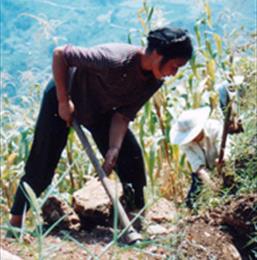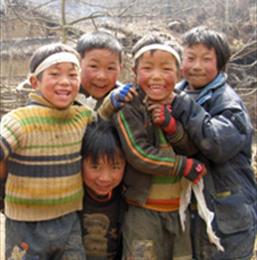Jun/July 2004
31st July 2004
Micro credit Project
Chenhe Village
In 2001, DORS held a participatory community development training for 50 villagers in Hanyuan County. The aim of the training was to strengthen the project management capacity of participants to achieve more sustainable community development in villages. The training sessions were held in Fulin, the County Town. Chen Guixiu from Chenhe Village was one of the participating villagers.
Chen Guixiu had never been to school and had learnt only how to write her name. Prior to this training, she had never been to Fulin Town. When DORS returned to Chenhe village in July 2004, Chen Guixiu talked again about how the training has helped her and the women in her village.
Chen Guixiu came back from the training with new practical ideas about how to develop small projects. She contacted DORS office shortly after the training and informed us that she would like to develop a community-owned bull project in the village. This would involve introducing a new species of bull to breed with local cattle and subsequently improve the quality of cattle in the village.
Chen Guixiu developed the idea for this project as a result of the participatory community development training. She learnt about project management during the training and before contacting us, she had thought about how it could be developed and managed in order to benefit the whole village. The project was to be managed by a group of six women (including herself), and a nominal fee was to be charged each time the bull were to breed. The profits were to be used to assist the poorest women in the village and support school fees for girls from poor families. Chen Guixiu asked DORS for financial support for the purchase of the bull and for micro credit loans for the six participating women to buy cattle. The project was approved and supported by DORS in August 2001. Please refer to DORS newsletter no. 45 for more information about this project.
Half way through the loan repayment cycle, Chen Guixiu again approached DORS with a request to further develop the micro credit project in Chenhe Village. She hoped this women's micro credit scheme might assist other women develop animal husbandry projects within their own households. She is now in charge of the Chenhe village women's micro credit scheme. Since October 2002, DORS has loaned a total of RMB 53,000 to 68 women in 3 hamlets enabling them to develop animal husbandry projects.
This year, to increase the efficiency of the bull project, Chen Guixiu asked for a new cycle of loans to be given to the management group of six women to improve the bull's welfare. The women decided it was time to build a stable for the bull to protect its immunity, health and growth. DORS granted a second loan of RMB 4000 to these six women.
Moduo Village
DORS started the third and fourth micro credit loan cycle in Moduo Village hamlet 2 and hamlet 9 respectively after both hamlet repaid in full and on time. For these new cycles, 32 women from hamlet 2 loaned a total amount of RMB 39,900 and 17 women in hamlet 9 loaned a total of RMB 22,500.
Participatory research on education in poor and remote villages
In June 2004 DORS began a participatory research project on education possibilities and constraints in remote villages in Hanyuan and Ganluo Counties. The aims of the research are: to find out more about why children do not go to school: to find out more about why children drop out of school; and to locate possible ways of improving the participation of poor and disadvantaged children in education. Findings will be used to inform the planning of our future work to improve school access and retention for children living in poverty.
This participatory research is enabling us to learn more about the lives of some children in villages in which we work. We have consulted a range of different village people to try to find out more about why children are not at school. We have talked to children of different ages, including those out at school and those out of school. We have also talked to parents, teachers, elders and village leaders.
We have used a range of different methods to try and learn the underlying reasons for children not attending school. These have included visiting children's homes and seeing family living conditions, joining children as they go about their everyday activities and observing what children's work involves. We have also experimented with visual and physical methods, such as drawing activities and ball games, as ways of learning more about the views and interests of out of school children.
The research will continue over the coming two months; DORS will keep its readers informed of the development of the research and also of its outcome towards the end of September.
Maping Village
In late June, DORS staff visited Maping village, Yongli Township, to carry out a baseline study in preparation for conducting integrated projects including forestry. The baseline study involved a range of participatory and village focused activities such as: focus group discussions with women and with poor household members; household interviews and observations with a range of wealth groups in the village; a general village meeting attended by a wide range of villagers; group mapping exercises in which small groups of villagers drew maps of their hamlets; and daily activity schedules in which a women's group explained the activities that make up their day's work.
Major development concerns for Maping village are: improving road access (only one hamlet can currently be reached by road); improving water supply (there is currently not enough water and some families have to travel a long way to reach water sources) and forestry development.
DORS news and information
Li Caihong left DORS in July, after a year of committed work as Project Assistant. DORS wishes her luck in her new job with the EU Poverty Alleviation Project in Hainan Province.
Gillian Tan who joined DORS for a short internship of two months in participatory methods left Hanyuan at the end of July 04.
Huang Haoran, from Wuhan, joined DORS in July to work as a Project Assistant. He has a strong interest in rural development and a background in computing, professional writing and English-Chinese translation.
In July 2004 DORS received a visit from Peng Yan, a consultant working for the Asia Development Bank Ya'an Xichang Highway construction project. Peng Yan was conducting a social survey on the situation of poor communities in Hanyuan and the impact of road construction on poverty alleviation.


